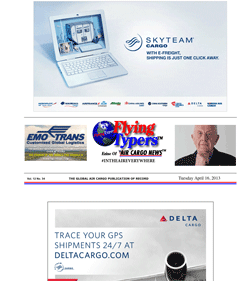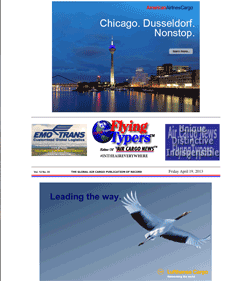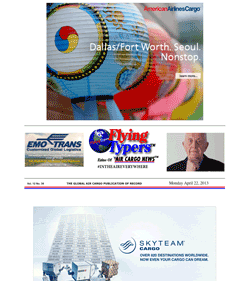 |
 |
|
| |
||
|
Vol. 11 No. 37 #INTHEAIREVERYWHERE Wednesday April 24, 2013 |
 |
|
|
 |

Chicago
Exclusive—Inside
United’s massive downtown
Chicago headquarters, Jim
is speaking about what it
has taken to combine two airline
cultures. His resolve is refreshing,
and reminds us of the lyrics
to an old Ringo Starr song:
“Got
to pay your dues,
“If
you want to sing the blues,
“And
you know it don’t come
easy.”
And
for United, for all the aforementioned
reasons plus soft spots on
the world air cargo business
landscape, 2012 and 2013 have
been about paying some heavy
dues while melding two cargo
operations into one and getting
everything in sync.
The
fact that he is now on the
trade show and cargo club
circuit can be seen as progress,
because who goes out with
nothing to talk about?

“I want to be a different
kind of sales leader.
“We
need to take a refreshed look
at our customers.
“What
I mean by that is that our
approach to our customers
from this point forward is
different that it was before.
“United
Cargo is more humble and very
much more appreciative than
before.
“Our
priority from now on is to
do what is fair for our customers
first, and the company second.
“If
you want to call that a paradigm
shift in the way we do business,
well, there it is.
“The
shift is on at United Cargo
and we believe it will change
things for the better.”
“When
we went into this merger together,
I was told:
“‘Jim,
sit up straight, poke your
chest out, and don’t
forget that you now work for
the world’s largest
airline, so be proud of it.’
“Now
with my new position leading
United Cargo’s global
sales team I can take an approach
with which I am more comfortable.
“United
Cargo will no longer portray
altitude as attitude.
“We
want the industry to do business
with our great airline and
its truly magnificent global
system, and thousands of bright
dedicated air cargo employees.
“My
top priority is to make our
customers and service partners
know that they are our number
one priority and that we will
never forget how important
they are.”

“I
joined Continental Airlines
Cargo Development Group in
1986 with people like Walt
Atkinson.
“We
were still a group of independent
third party sales people,
real 1099ers, earning straight
commission on everything we
sold.
“It
was very lucrative back in
the day, as CDG was a subsidiary
of Continental and we actually
utilized what we called ‘monthly
gain sharing.’
“What
that meant was that as our
operations made money, a percentage
was divided up amongst all
of us.
“What
an incentive!
“People
would get on each other for
wasting anything—a cargo
net, even toilet paper, saying
things like:
“‘Hey,
save that net—a new
one comes out of our profit
sharing.’
“Not
everybody was crazy about
CDG’s policy; in fact,
some ramp folks thought it
unfair, but we made money
and had a growing product
line that continued right
into the time Frank Lorenzo
came along and integrated
CDG into the airline.
“Later
our product continued to grow,
develop, and prosper as Jack
Boisen and Jim McKeon led
the charge at Continental
Cargo.

“The
short version of my title
is global sales.
“I
moved over to this post from
cargo sales director, the
Americas, just about 90 days
ago.
“I
have been in cargo sales for
27 years and I guess the GSA
experience has stayed with
me for my entire career, for
its entrepreneurial spirit
and the feeling that when
you put something into your
effort, the reward coming
back is felt and appreciated.
“I
like to make that experience
work today up and down the
line, thinking that income
should be equal to ability
and ambition.
“It’s
a good rule, an outgrowth
of my time as a GSA, not always
easy to implement with everyone,
but basic and fine with me.”

Jim Bellinder certainly knows
that he has a big job ahead
of him.
It
is no secret that United Cargo
suffered during the integration,
as challenges from matching
up metal to schedules and
people and even market approach
have caused slippage in market
share for the Chicago-based
carrier.
Delaying the phased introduction
of B787, an airplane that
the carrier has pretty much
pinned its future hopes upon,
has not helped much either.
So
ever the sales guy with a
story to tell—including
the fact that his role in
the team that reports to Robbie
Anderson finally feels like
it has actually turning the
corner in addressing major
issues—Jim sets out
on the rubber chicken circuit
as a global effort now begins.
Jim
will tell his audiences that
it is a new day and despite
whatever went on previously,
he will be only as far away
from the action as an email
or a cell phone, and that
the spirit of a new United
Cargo will make leveraging
a powerful global cargo resource
possible.
“United
is eager to make things work
from the ground up by putting
the customer first.
“Our
Cargo Sales team that goes
out on the front line every
day all over the world—over
160 people, is focused on
going the extra mile to find
solutions for our customers
.
“Down
deep we know that we can never
forget how important our customers
are.
“Now
is the time to deliver on
that reality,” Jim Bellinder
said.
Geoffrey/Flossie
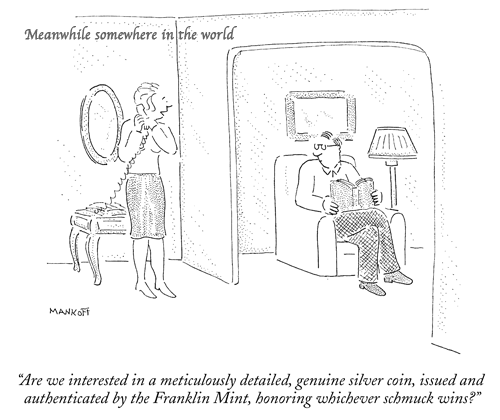 |
Get
On Board Air Cargo News
FlyingTypers |
|
If
You Missed Any Of The Previous
3 Issues Of FlyingTypers |
|||||
|
|||||
FT041619 |
FT042213 |
||||
|---|---|---|---|---|---|


 nce
again, the JFK Air Cargo Association
delivers a first class program
on Thursday, April 25th, as
new United Cargo VP-Sales,
Jim Bellinder, lays plain
the pain (and even the plane—the
B787) of taking a huge retooled
air cargo resource to the
next level. Jim began his
air cargo career in 1986 as
a GSA for Continental Airlines;
today he is responsible for
all aspects of United Cargo’s
sales activity around the
globe. On Thursday he speaks
right to the heart of the
challenges and difficulties
the carrier has encountered
during its integration activity
during the past couple of
years.
nce
again, the JFK Air Cargo Association
delivers a first class program
on Thursday, April 25th, as
new United Cargo VP-Sales,
Jim Bellinder, lays plain
the pain (and even the plane—the
B787) of taking a huge retooled
air cargo resource to the
next level. Jim began his
air cargo career in 1986 as
a GSA for Continental Airlines;
today he is responsible for
all aspects of United Cargo’s
sales activity around the
globe. On Thursday he speaks
right to the heart of the
challenges and difficulties
the carrier has encountered
during its integration activity
during the past couple of
years.
 Celebi
has had a long link with India.
The company was given the
ground handling licenses for
operations in Mumbai Airport
(in July 2009) and in Delhi
Airport (in June 2010). In
2009 the Çelebi Delhi
Cargo Terminal Management
was given the concession to
develop, modernize, finance,
and operate the existing cargo
terminal for a period of 25
years.
Celebi
has had a long link with India.
The company was given the
ground handling licenses for
operations in Mumbai Airport
(in July 2009) and in Delhi
Airport (in June 2010). In
2009 the Çelebi Delhi
Cargo Terminal Management
was given the concession to
develop, modernize, finance,
and operate the existing cargo
terminal for a period of 25
years. 
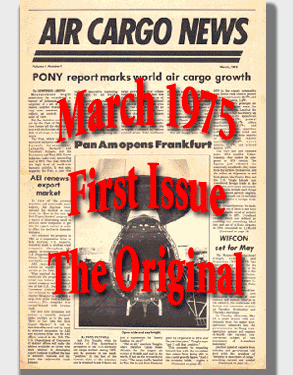

 The
International Air Transport Association
(IATA) named Warren Jones as Head
of Cargo Network Service (CNS)
in time for the CNS Partnership
Conference kicking off in Phoenix
on May 5.
The
International Air Transport Association
(IATA) named Warren Jones as Head
of Cargo Network Service (CNS)
in time for the CNS Partnership
Conference kicking off in Phoenix
on May 5.
 ne
thing becomes abundantly clear
after reading a recent Forbes
Magazine Middle East
article titled “Most
Influential Women In A Family
Business.”
ne
thing becomes abundantly clear
after reading a recent Forbes
Magazine Middle East
article titled “Most
Influential Women In A Family
Business.” Added
to any list, past or present,
must be two up and coming
air cargo executives at Emirates
SkyCargo.
Added
to any list, past or present,
must be two up and coming
air cargo executives at Emirates
SkyCargo.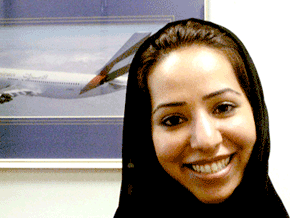 The
first thing one notices about
Budoor is her level gaze,
bright smile, and traditional
Arab Abaya and Hijab. She
is dressed all in black, as
are many women in this region,
whether at business or at
home. It is a matter of tradition
and pride.
The
first thing one notices about
Budoor is her level gaze,
bright smile, and traditional
Arab Abaya and Hijab. She
is dressed all in black, as
are many women in this region,
whether at business or at
home. It is a matter of tradition
and pride.